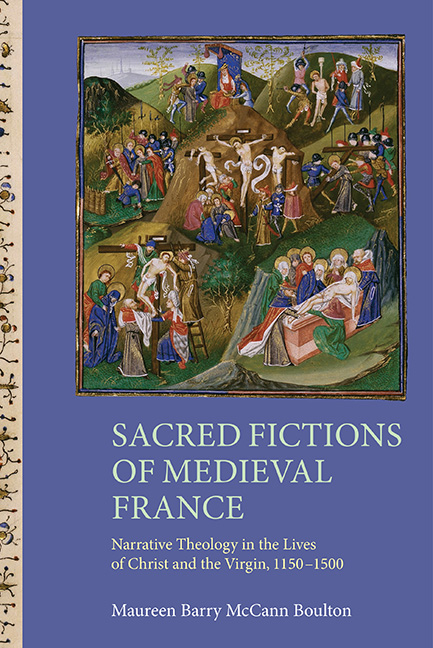 Sacred Fictions of Medieval France
Sacred Fictions of Medieval France Book contents
- Frontmatter
- Dedication
- Contents
- Acknowledgements
- Abbreviations
- Introduction
- 1 Sacred Romances: Genealogy, Lineage and Cyclicity
- 2 Sacred Epic and the Diffusion of Anti-Jewish Sentiment
- 3 Sacred Allegory and Meditation
- 4 Sacred Histories: the Chronicles of Jean d’Outremeuse and Jean Mansel
- 5 Sacred Imaginations: Lives of Christ and the Virgin in Texts of A ffective Devotion
- Epilogue: Lives and Afterlives
- Appendix: Lists of Manuscripts by Chapter
- Bibliography
- Index
4 - Sacred Histories: the Chronicles of Jean d’Outremeuse and Jean Mansel
Published online by Cambridge University Press: 11 June 2021
- Frontmatter
- Dedication
- Contents
- Acknowledgements
- Abbreviations
- Introduction
- 1 Sacred Romances: Genealogy, Lineage and Cyclicity
- 2 Sacred Epic and the Diffusion of Anti-Jewish Sentiment
- 3 Sacred Allegory and Meditation
- 4 Sacred Histories: the Chronicles of Jean d’Outremeuse and Jean Mansel
- 5 Sacred Imaginations: Lives of Christ and the Virgin in Texts of A ffective Devotion
- Epilogue: Lives and Afterlives
- Appendix: Lists of Manuscripts by Chapter
- Bibliography
- Index
Summary
Et puet ce livres estre apellé la Fleur des Histoires;
car comme de la fleur vient le fruit, ainsi de mirer et
regarder souvent en cestui Fleur puet venir bon fruit a
ceulx qui se y occuperont a la loenge de Dieu qui vueill
mener ceste euvre a perfection. Amen.
(Brussels, KBR, 9231, fol. 9vb)[And this book may be called the Flower of Histories; for as the fruit comes from the flower, so from looking and reflecting often in this Flower can come good fruit to those who occupy themselves with it to the praise of God who may bring this work to perfection.]
The tradition of combining sacred and profane history began in the early fourth century with Eusebius, whose Greek Chronicle conflated the chronological canons of the Hellenistic historians of Mesopotamia and Egypt with those of the Greeks, Romans, Hebrews, and Christians; he reconciled them into summary annals covering the history of the world from Creation (which he placed in 5198 B.C.) to the year 324. His annals were translated into Latin by Jerome, and were used and reused as the basis for similar chronicles and histories throughout the Middle Ages. Building on that tradition, early Christian historians like Isidore of Seville (in his Chronica majora of shortly after 600) conceived of Divine Providence as the basis of continuity between past, present, and future; they also established a pattern that could be modified by their successors. Christian chronicles were normally conceived of as ‘universal chronicles’, dealing in principle with the history of the whole world from the beginning. Thus they would begin with the creation of the world, meld ancient (especially Greek) history with the Old Testament, continue with Roman history, and follow them with episodes from the New Testament and early Christian history, before finally recounting contemporary events.
In most chronicles, the segment devoted to biblical and patristic history was the most derivative, and was often abbreviated, while the portion devoted to the author's period and region was the most – indeed, the only – original part. Consequently, the early parts of most chronicles, including those covering the period of the New Testament, are scarcely discussed by modern historians. They are nevertheless of considerable interest here.
- Type
- Chapter
- Information
- Sacred Fictions of Medieval FranceNarrative Theology in the Lives of Christ and the Virgin, 1150–1500, pp. 191 - 228Publisher: Boydell & BrewerPrint publication year: 2015


